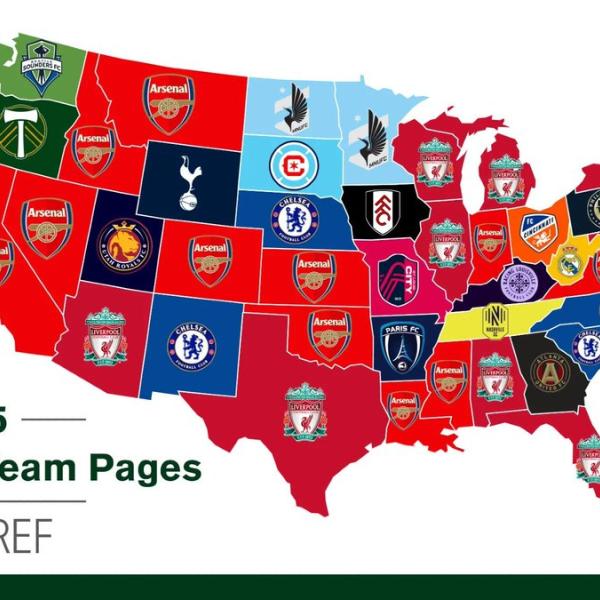What if the European leagues adopted a playoff system to determine league winners? For many this idea may sound crazy, but it shouldn’t be fully discarded. Although Europe is considered to have the best leagues in the world, there are many who criticize it for being too predictable and noncompetitive.
Apart from the Premier League, most leagues only have two or three teams that challenge regularly for the title. Others, like Germany, Italy and Scotland, are completely “monopolized” by one team. By implementing a playoff system, it could make these leagues more exciting than they already are now.
How would this work? Easy. At the end of the regular season, the top 8 teams are seeded in order. To better explain this, let’s use the current La Liga standings as an example.
Quarterfinals:
1st vs 8th - Real Madrid vs. Celta Vigo: 1st advances
2nd vs 7th - Sevilla vs. Athletic Bilbao: 7th advances
3rd vs 6th - Barcelona vs. Villarreal: 3rd advances
4th vs 5th - Atletico Madrid vs. Real Sociedad: 4th advances
In the semifinals, the lowest remaining seed would take on the highest remaining seed, while the team with the second best record faces the one with the second worst record.
Semifinals:
1st v. 7th - Real Madrid v. Athletic Bilbao
3rd v. 4th - Barcelona v. Atletico Madrid.
Both quarter and semifinals would be a two legged affair, with the lowest seed hosting the first game. The final would be a one game winner take all match at a neutral venue.
However, the question is would a playoff system in European soccer actually work? Let’s look at the pros and cons of a playoff system.
Pros:
More money: This doesn’t just include the big teams, but also for the more moderate and small teams. Even though it’s 5 additional games, this means more money in terms of TV rights (which can even be distributed accordingly to all the first division teams) and matchday revenue.
It can also give top leagues like La Liga, Serie A, Bundesliga, and even Ligue 1 the chance to better market all their team worldwide and allow a lot of the mid/bottom table teams to gain more global exposure, interest, and possibly sponsors.
European positions won’t be affected: The same Champions League and Europa League format that most of the top leagues use would not be affected by the playoff system unless the playoff winner finished the regular season outside of a European winner.
In that case, the winner would gain automatic qualification for the Champions Leagues, the team that originally had the last Champions League spot would drop to the Europa League position, and the team with the last Europa League position would be knocked out of European competition.
Competitiveness and excitement: With an eight team playoff and the same European qualification system still intact, it would make both the regular season and playoffs more competitive and exciting throughout the entire season. Teams in the top half of the table would want to secure their positions for a place in Europe and those at the bottom would see it as a chance to battle for just more avoiding relegation.
Once again, let’s use the current La Liga standings as an example. At this moment, Celta Vigo sit in 8th position on 27 points, while Leganes are 17th with 18. Despite being closer to the relegation zone, Leganes would only be 9 points off from getting into a playoff position. With a good run of results and some bad performances from the teams above them, they could get into that last playoff position and have a chance to compete for the title.
Cons:
More games: As fans, that sounds great; but for players and coaches, not so much. Already, many coaches across Europe (especially in England) have complained about the amount of games played. Most of those complaints come from the European giants who play a considerably high number of games from August to May. This not just includes league fixtures, but the domestic cup and European competitions as well.
League participants: With all the games being played, leagues may decide to find ways to limit the amount of games played. How would they go about this? Probably reducing the amount of teams in first division. Those leagues that have 20 first division sides may reduce the number to 18 or even 16. Reducing the amount of games from 38 to 36 (18 teams) or 32 (16 teams). A playoff system may sound great, but try explaining to those moderate/small teams that they would have to limit the amount of teams in the first division.
Scheduling issues: Even if each league figure out a way to reduce league games, they would still need to deal with the domestic cup and European competitions as previously mentioned. This may result in more midweek games being played and players having less time to recover physically after a match. Something that could possibly lead to more injuries as a result of the congested fixture schedule.
Of course we are not saying that these cons would indeed happen if a playoff system were to be implemented. There is a way to implement a playoff system while avoiding those issues. No one knows if a playoff will ever even be considered by the European leagues, but it wouldn’t be a bad idea to help those leagues be more entertaining and competitive.








